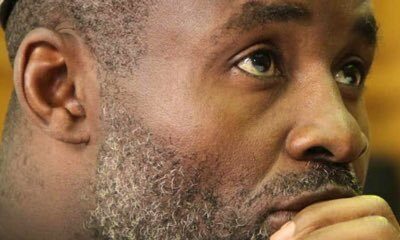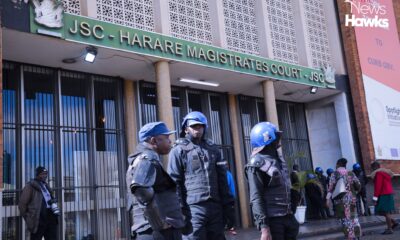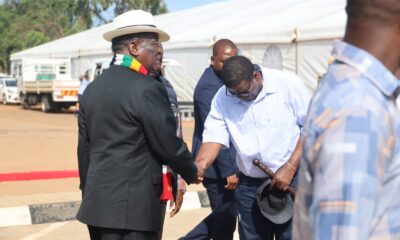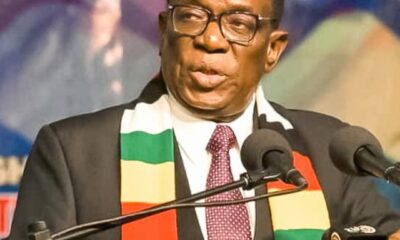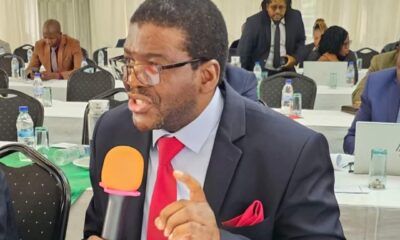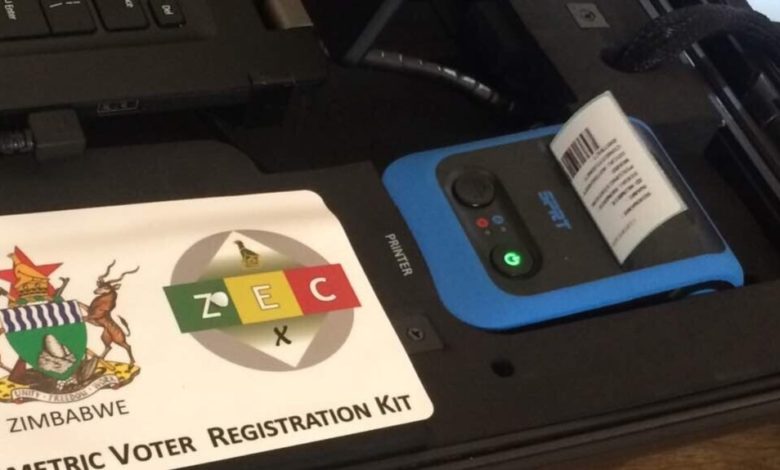
Opinion
Who wants to stop the by-elections?
Published
4 years agoon
By
NewsHawksALEX MAGAISA
Tortoises on fence posts
AS the country prepares for by-elections scheduled for the end of this month, there is yet another sighting of the proverbial tortoise on a fence post in Harare.
His name is Tapera Sengweni. In fact, there are three others: Vinnah Mbele, Edify Vushoma and Phanuel Tsvanu. But Sengweni is the lead applicant. The four have applied to the Constitutional Court challenging the proclamation of by-elections by President Mnangagwa.
They want the by-elections stopped.
As the adage goes, when you see a tortoise on a fence post, you know that it did not get there on its own. Someone put it up there. But who might that be? Social media was quick to put the pieces together clues of which led to an association with Douglas Mwonzora, leader of the beleaguered MDC-T. Sengweni has a chequered history which includes de-registration from the register of legal practitioners by the legal regulator for embezzlement of trust funds. His lawyer in a case in which he fought the Law Society of Zimbabwe was Douglas Mwonzora.
Now that might be purely coincidental. But some suggested that he still works for Mwonzora. For his part, Mwonzora was quick to distance himself and his party not from Sengeweni but from his application. “The MDCT has neither filed nor sponsored any court application to stop by-elections,” tweeted Mwonzora on Twitter, the micro-blogging site. “The application being circulated has been filed by a group of 4 Zimbabweans. We do not interfere with Zimbabweans seeking to assert their rights,” he added.
Alter egos and plausible deniability
Most of the media does not appear to be persuaded by Mwonzora’s spirited attempt to disassociate himself and his party from the case. Effectively, Sengweni and the other three are seen as Mwonzora’s surrogates.
It doesn’t help Mwonzora’s case that he has form in this area. Back in 2016, he was allegedly behind a legal challenge against Morgan Tsvangirai’s decision to appoint two additional deputy presidents. The applicant was a close associate of Mwonzora before they fell out. This case had a brief and miserable life.
But that was not the end of the saga. One Elias Mashavira brought a similar case in 2018, this time challenging not just Tsvangirai’s decision but also Nelson Chamisa’s ascendancy to the presidency of the MDCT. Success, in that case, had a catastrophic effect on the MDC Alliance, which was led by Chamisa. Things got so bad that Chamisa and his allies had to form a new party, the Citizens’ Coalition for Change (CCC). What is notable in both cases is that although Mwonzora was nowhere in front, it was clear that he was the directing hand and mind of both litigants who were merely his alter egos. But Mwonzora distanced himself from those cases just as he is currently distancing himself from the current case.
The use of alter egos in political litigation is not unusual in Zimbabwean politics. It creates enough distance that gives the interested parties plausible deniability. They can always say they were never involved, but if things go well, they will happily celebrate the outcome and even take the credit.
When Mashavira’s case was concluded, it was Mwonzora and Komichi who celebrated the most. Mashavira himself has barely featured since that controversial judgment in March 2020. One of the most well-known such cases is the application brought by Jealousy Mawarire in 2013 compelling President Mugabe to proclaim election dates. It was the outcome that Zanu PF wanted, and the litigation was designed to give judicial justification to its plan.
Why there is no appetite for elections
If, as is widely suspected, Mwonzora is behind the Sengweni application, the other question is whether he is in it alone or is in cahoots with Zanu PF. It is known that Mwonzora has met with Mnangagwa at least a couple of times. It is also on record that Mwonzora has expressed his displeasure with the looming by-elections.
He owes his current political to judicial decision-making more than electoral contestation and has not demonstrated an avid appetite for elections. Whether Mnangagwa is in on this plan to stop elections will be revealed by how the matter progresses. But if Mnangagwa and Zanu PF are involved, then it is a fait accompli. The courts will find a way to make it happen.
There are several reasons why Mnangagwa has no incentives to carry on with the elections. He might have proclaimed by-election dates just to pretend that he was fulfilling his constitutional obligations, knowing very well that there would be sponsored litigation to stop them. When that happens, he can always say it is not his fault. One clue will be how he responds to this application. He might put up a lame defence and say that he will abide by whatever the court decides. He will probably do the same too. When you see them being non-committal like that, failing to defend their conduct, it will mean they are probably in on the plot to stop the by-elections.
Mnangagwa’s prospects of winning the by-elections which are mostly in opposition strongholds have always been slim and they have diminished even further with the strong showing of the Citizens Coalition of Change as a potent political force. It is not the pandemic that delayed the by-elections but the fact that Mnangagwa was not sufficiently invested in them. Most countries, including neighbours, were holding major elections during the pandemic.
He simply did not want anything that would disturb the narrative that he was promoting which suggested that Dr Thokozani Khupe and later, Mwonzora were his legitimate political rivals, ahead of Chamisa. By-elections offered Chamisa an opportunity to arrest the reversal of fortunes that he was experiencing thanks to the regime’s machinations using the opposition surrogates.
In addition, with the ways political circumstances have turned out in recent weeks, the by-elections have outlived the purpose for which they were originally called. When Mnangagwa called the by-elections, it was not because he had suddenly discovered the importance of his constitutional obligations. Rather, it was a strategic move to further weaken his main rival Chamisa whom he thought was reeling after the systematic and sustained assault on his old party, the MDC Alliance. Mnangagwa gambled that Chamisa would throw a fit and boycott the by-elections. This would have left his surrogate with an easy electoral field. Chamisa refused to take the bait.
The second move was to weaken Chamisa by allowing Mwonzora to grab the party name. Mnangagwa gambled that Chamisa would be obstinate and insist on using the MDC-Alliance as his electoral vehicle for the by-elections. Again, Chamisa confounded him when he announced a new party, the Citizens’ Coalition for Change. Therefore, the mud-fight that he had anticipated between Chamisa and Mwonzora, in which compromised referees would have ruled in favour of Mwonzora never happened. The first set of star rallies demonstrated the gulf between Chamisa and Mwonzora and confirmed that Mnangagwa placed his bet on a limping horse. Realizing that Mwonzora faces annihilation at the polls, neither Mnangagwa nor Mwonzora are keen on the by-elections.
Section 134 also prohibits statutory instruments from infringing or limiting fundamental rights and freedoms. The suspension of by-elections using a statutory instrument violated the right to vote among other rights and freedoms.
The Constitution indeed imposes a mandatory obligation on the President to proclaim by-elections within 90 days of a vacancy arising in parliament or council. While it is arguable that the pandemic was a supervening factor that made it difficult to hold elections, it did not make it impossible as the experience of other countries shows. In any event, there were legal options for the government to suspend elections constitutionally. The government chose to use a statutory instrument under the Public Health Act, but as already stated, subsidiary legislation cannot be used to amend a constitutional provision.
The fact that there was ongoing illegality raises interesting questions for Sengweni and his sponsors. If anyone thought it was necessary to compel the government to comply with the Constitution, they had plenty of opportunities to do so. Sengweni and his co-applicants say they are motivated by their desire to ensure the correct interpretation and application of the Constitution. But if they were genuine, they would have taken action to compel Mnangagwa to hold by-elections when they fell due. They knew or should have known that not holding by-elections was a clear constitutional violation, but they did nothing about it. Instead, they are now seeking to add illegality to illegality.
If the theory that they are connected to Mwonzora is true, it is easy to see why they had no interest in enforcing enforce the constitutional provision to compel the holding of by-elections. Mwonzora’s party is the cause of the by-elections, but it has never been keen on by-elections because they will expose its weakness in the court of public opinion. Mwonzora and company were delighted with the illegal suspension of the by-elections because it meant they did not have to face public judgment. Hence, they even pleaded with Mnangagwa and ZANU PF to avoid holding by-elections.
A dog’s breakfast
Although the government committed illegalities when it failed to hold by-elections as required by the Constitution, the application by Sengweni and his co-applicants leaves a lot to be desired. It was filed just 3 weeks before the by-elections as an ordinary court application which means it will not be heard before the elections that it is meant to stop. This is because the time slots within which specific processes must be done in conducting such an application take long.
To avoid these lengthy processes, they may try to convert it into an urgent application, but they will struggle to convince the court that it is an urgent matter. The proclamation was made at the start of the year; the nomination court was held, and the election date is almost due. If it is urgent because of the imminence of the by-elections, it is a type of urgency that the applicants brought upon themselves which is not sufficient for purposes of an urgent application.
Vague and embarrassing
In addition, the application contains only bare facts which makes it extremely vague and embarrassing. When you make such an application, you must set out the full facts in the affidavit which make out your legal case. The facts must be in such a manner that they enable the respondent to make an informed response.
Sengweni’s application is full of glaring errors and generalizations. Take, for example, paragraph 14 where Sengweni claims that his application is for a determination that the President “failed to call for by-elections in all 28 House of Assembly seats and council seats within the time stipulated by the constitution of Zimbabwe …” For a start, there is no such thing as the “House of Assembly” in Zimbabwe’s Parliament. This means his affidavit refers to something that does not exist. He makes no effort whatsoever to state for the court the time within which the by-elections were supposed to be held.
More significantly, Sengweni does not state the exact dates when each of the vacancies that are the subject of his application arose and when, therefore, the by-elections fell due. This exact information is necessary to establish the alleged breach. He merely states in paragraph 16 that “I witnessed vacancies as they occurred in the constituencies”. Anyone can say this, but it means absolutely nothing. One cannot allege breaches but make generalized statements that do not establish evidence of the breach. A diligent applicant would have specified the dates when each of the 28 vacancies arose and when the by-elections were due to be held.
He simply states in paragraphs 17-19 that he waited for the President to proclaim by-election dates and that “The time specified by Zimbabwe’s Constitution came and went”. How much time this is, Sengweni does not say. In short, the case for the alleged breach is not apparent from the application. He is just reciting a general story that might work for a pub conversation but has no place in a serious court of law. Needless to say, he doesn’t even deal with the more than 100 local authority by-elections whose legality he is also challenging.
Non-citation of relevant parties
It is a basic rule of procedure that when you challenge an election matter, you must cite all parties that are affected by the outcome of the decision. In this case, apart from the President who made the proclamation, the applicant must cite the electoral authority and all parties that are participating in the elections.
These parties include political parties and candidates that have been duly nominated for the elections. Once the nomination court has sat and concluded its work, all nominated candidates have a vested interest in the election. They have a legitimate expectation to be cited so that their side can be heard by the court. Sengweni and his lawyers should have known this, but they only cited two parties: Mnangagwa and ZEC. They omitted all the political parties and candidates that have legal rights and interests in the election that they are challenging. It’s not an application that has been attended to with the seriousness and diligence that it deserves.
Presumption of legality
I have already argued that the procedure by which the government suspended elections was unlawful. However, the regulations that were issued by the Minister of Health under the Public Health Act remain lawful until they have been challenged and struck down by a court of law. This is based on the presumption of legality, which means every law is presumed lawful until it has been declared unlawful by a competent court.
Therefore, Sengweni and his co-applicants should have known that the basis upon which the by-elections were suspended in the Public Health regulations and that they have the force of law until they have been declared otherwise. Their application should have challenged the legality of these regulations, and this means they should also have cited the author of those regulations, namely the Minister of Health and Child Care so that he has an opportunity to present his defence. As it is, the application is misconceived because it does not challenge the legality of the regulations suspending the by-elections.
Unsolicited opinion
Sengweni goes further to offer an unsolicited opinion concerning the relevance of holding by-elections. “In any event, there is really no need for by-elections now”, he declares before offering some advice. “This country is due to hold its harmonised elections in the next 16 months, it is prudent to wait for that date”. It is ironic that a man who claims to be protecting the correct interpretation of the constitution wants it to be ignored on the ground that the next general elections are more than a year away. He is oblivious of the fact that the constitution itself anticipates when it is not prudent to hold by-elections. Section 158(3) of the Constitution provides that, “Polling in by-elections to Parliament and local authorities must take place within ninety days after the vacancies occurred unless the vacancies occur within nine months before a general election is due to be held, in which event the vacancies may remain unfilled until the general election.” (my emphasis).
Under this provision, the period within which a by-election may not be held is if the vacancy occurs within 9 months before the next general elections. Sengweni wants to change this although he knows the general election is 16 months away. He is asking the court to ignore a clear constitutional provision. Such disregard of the Constitution is not something that can be associated with self-proclaimed constitutionalists.
Non-legal arguments
But Sengweni is not done. Bereft of serious legal arguments, he offers a paltry socio-economic analysis as a last throw of the dice. Describing Zimbabwe as a “small economy”, Sengweni declares without producing any supporting evidence to prove his statement that “Zimbabwe has financial challenges that are affecting the greater majority of the people.”. He does not think it is “prudent to drag the country into another plebiscite whose outcomes will not change the numerical configuration of parliament in any way”.
They are just bare assertions that might be used in a pub conversation, but they have no place in serious legal documents. If financial challenges were a good reason to disregard an election, with its perennial problems Zimbabwe would have a good excuse to avoid elections, thereby cementing a dictatorship. In any event, it is not the role of the court to wade into the economic affairs of the country. If Sengweni was serious, he should have cited the minister responsible for the treasury (Finance minister) to give him an opportunity to make an authoritative statement on national finances.
Contempt for MPs
One of the most shocking parts of Sengweni’s averments is his view regarding the role of parliament. “At present the purpose of Zimbabwe parliament is to enact national law. There is no individual value of a member of parliament at all. Any law made by parliament will affect every Zimbabwean equally. It does not matter for example that the Member of Parliament for Mkoba is out of Parliament. Parliament can still produce quality law led by debate from a Member of Parliament of say Umguza constituency” (sic), he declares without any sense of irony. For someone who claims to be defending the Constitution, he demonstrates poor knowledge of it. If he did, he would know that law-making is only one of the functions of the legislature. Apart from its legislative function, parliament has the function of holding the state and its institutions to account and to ensure that the constitution is upheld[1].
By saying “there is no individual value of a member of parliament at all”, Sengweni contemptuously dismisses the very people who make up parliament and more significantly, disregards the fundamental rights to vote and to representation that are protected by the Constitution that he purports to be defending. One of the most fundamental constitutional values in section 3 of our Constitution is an electoral system based on “adequate representation of the electorate”. It is on this principle that by-elections are based. They are held to ensure that citizens are adequately represented even when a vacancy occurs during the term of parliament. Sengweni and his handlers have no regard for democracy and the role of elected representatives.
Lack of seriousness
In his emaciated affidavit, Sengweni claims the President’s proclamation called for “House of Assembly by-elections in a total of 28 constituencies”. I have already stated that there is no such thing as a House of Assembly in the Zimbabwean parliament. There is a National Assembly which is presumably what he means. Although this might seem pedantic, an affidavit is a sworn statement that articulates facts. This elementary error, which is repeated throughout the affidavit, is a further show of lack of seriousness and diligence on the part of the applicant. Further evidence of lack of seriousness is when Sengweni refers to vacancies in “parliamentary and council constituencies”. There is no such thing as a “council constituency”.
In conclusion, Sengweni’s application is woefully inadequate. While Sengweni might be dismissed as a chancer, circumstances suggest that he and his co-applicants are not acting alone. They are someone’s tortoises on a fence post. Someone placed them there. They have kept at a distance to ensure plausible deniability. But whoever they are, the poor quality of the application betrays their lack of seriousness.
The drafting leaves a lot to be desired. It is woefully lacking in substance. The most basic requirements of such an application are violated. It is an application that tests the patience of even the most tolerant judicial officer. Someone is desperate to stop the by-elections and it can only be a participant who has no confidence in citizens’ judgment in electoral contests. It’s likely those that have relied on the courts of law for their political lives are trying one last desperate attempt at a lifeline.
About the writer: Dr Alex Magaisa is former adviser to Zimbabwe’s late prime minister Morgan Tsvangirai and a law lecturer at Kent University in Britain.



